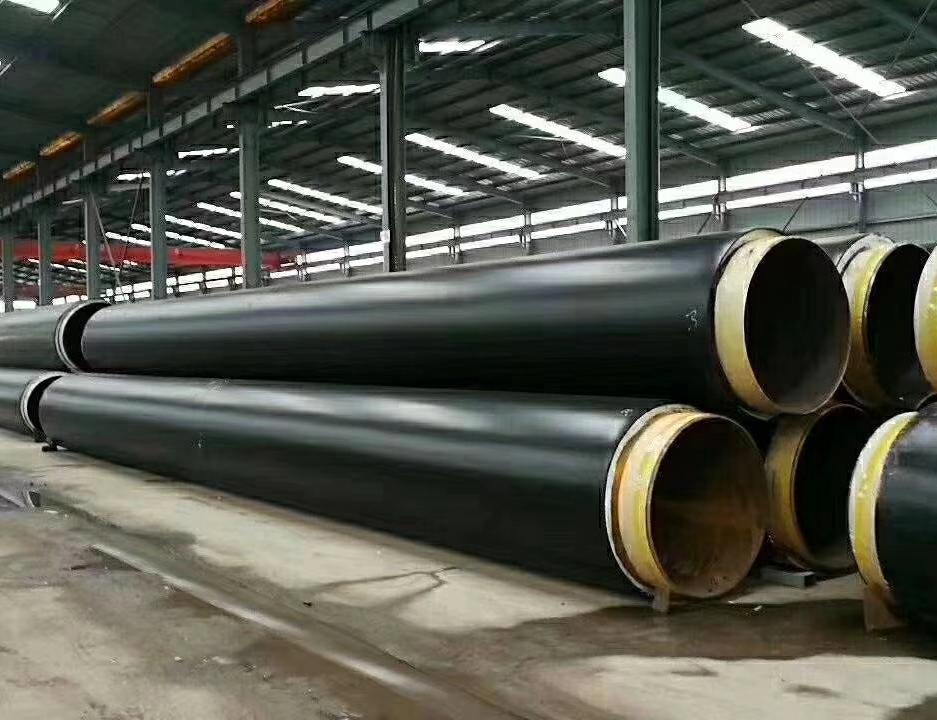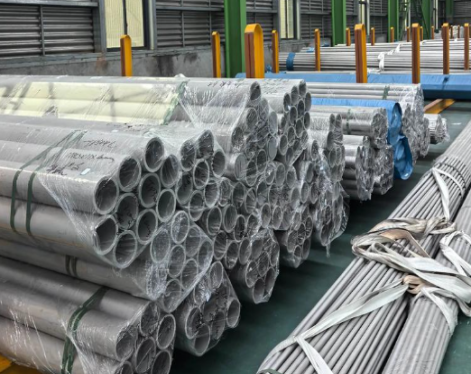Polyurethane insulation pipe has excellent characteristics such as light bulk density, high strength, heat insulation, sound insulation, flame retardant, cold resistance, anti-corrosion, non-absorbent, simple and quick construction, etc. It has become an indispensable material for thermal insulation, waterproof plugging and sealing in construction, transportation, petroleum, chemical, electric power, refrigeration and other industrial sectors.
The main components of polyurethane insulation pipe:
1. Protective shell: high-density polyethylene or fiberglass.
2. Insulation layer: use rigid polyurethane foam.
3. Working steel pipe:According to the technical requirements of the conveying medium, welded steel tubes, seamless steel pipes, and double-sided submerged arc spiral welded steel pipes are used respectively.
4. Leakage alarm line:When manufacturing high-temperature prefabricated direct-buried thermal insulation pipes, an alarm line is buried in the thermal insulation layer close to the steel pipes. Once a leak occurs somewhere in the pipeline, through the conduction of the alarm line, an alarm can be displayed on the special detection instrument and the exact location and degree of the leak will be displayed. In order to notify the maintenance personnel to quickly deal with the leaking pipe section and ensure the safe operation of the heating network.

Construction characteristics of polyurethane insulation pipe
1. Reduce project cost
According to the calculations of relevant departments, double-pipe heating pipes can generally reduce the project cost by about 25% (using FRP as the protective layer) and 10% (using high-density polyethylene as the protective layer).
2. Low heat loss, saving energy
The thermal conductivity of the high-temperature prefabricated direct-buried thermal insulation pipe is: λ=0.013-0.03kcalm·h·oC, which is much lower than other pipe insulation materials commonly used in the past, and the thermal insulation effect is increased by 4~9 times. Furthermore, its water absorption is very low, about 0.2kgm2. The reason for the low water absorption is that the closed cell rate of polyurethane foam is as high as about 92%. Low thermal conductivity and low water absorption, coupled with thermal insulation layer and outer high-density polyethylene or fiberglass protective shell with good waterproof performance. The overall heat loss of the heating pipeline is greatly reduced, and the heat loss of the heating network is 2%, which is less than the international standard requirement of 10%.
3. Anti-corrosion, good insulation performance, long service life
The high-temperature prefabricated direct-buried thermal insulation pipe has a good anti-corrosion effect because the insulation layer of the polyurethane thermal insulation pipe is tightly bonded to the outer skin of the steel pipe, which isolates the infiltration of air and water. At the same time, its foam cells are closed, and its water absorption is very small. Both high-density polyethylene shell and glass fiber reinforced plastic shell have good anti-corrosion, insulation and mechanical properties. Therefore, the outer skin of the working steel pipe is difficult to be corroded by external air and water. As long as the internal water quality of the pipeline is well treated, the service life of the high-temperature prefabricated direct-buried thermal insulation pipe can reach more than 50 years, which is 3~4 times longer than the service life of traditional trench laying and overhead laying.
4. Less land occupation, fast construction, favorable for environmental protection
Directly buried heating pipes do not need to build huge trenches, but only need to bury the insulation pipes underground, thus greatly reducing the land occupation of the project, reducing the amount of earthwork excavation by more than 50%, and reducing the amount of civil masonry and concrete by 90%. At the same time, the processing of thermal insulation pipes and on-site trenching are carried out in parallel, and only on-site joints are required, which can shorten the construction period by more than 50%. Prefabricated direct-buried thermal insulation pipes are widely used in liquid and gas transportation pipe networks, chemical pipeline insulation projects in petroleum, chemical, central heating and heating networks, central air-conditioning ventilation pipes, municipal engineering, etc.
The direct-buried thermal insulation pipe is a kind of direct-buried prefabricated thermal insulation pipe with good thermal insulation performance, safety and reliability, and low engineering cost.It effectively solves the problems of thermal insulation, sliding lubrication and waterproofing of exposed pipe ends for prefabricated direct-buried thermal insulation pipes for 130°C-600°C high-temperature heat transfer in urban central heating. Directly buried thermal insulation pipes not only have advanced technology and practical performance that are incomparable to traditional trenches and overhead laying pipelines, but also have significant social and economic benefits, and are also powerful measures for heating and energy saving. The prefabricated direct-buried thermal insulation pipe adopts the direct-buried heating pipe technology, which marks that the development of China's heating polyurethane thermal insulation pipe technology has entered a new starting point.
5. The alarm system can be set to automatically detect the leakage fault of the pipe network, accurately indicate the fault location and automatically alarm
The polyurethane insulation pipe is equipped with a leakage alarm line. Once a leak occurs somewhere in the pipeline, through the conduction of the alarm line, the water seepage of the thermal insulation pipeline, the exact location of the leak and the size of the leak can be displayed on the special detection instrument. In order to notify the seepage inspection personnel to quickly deal with the leaking pipe section and ensure the safe operation of the heating pipe network.
The main components of polyurethane insulation pipe:
1. Protective shell: high-density polyethylene or fiberglass.
2. Insulation layer: use rigid polyurethane foam.
3. Working steel pipe:According to the technical requirements of the conveying medium, welded steel tubes, seamless steel pipes, and double-sided submerged arc spiral welded steel pipes are used respectively.
4. Leakage alarm line:When manufacturing high-temperature prefabricated direct-buried thermal insulation pipes, an alarm line is buried in the thermal insulation layer close to the steel pipes. Once a leak occurs somewhere in the pipeline, through the conduction of the alarm line, an alarm can be displayed on the special detection instrument and the exact location and degree of the leak will be displayed. In order to notify the maintenance personnel to quickly deal with the leaking pipe section and ensure the safe operation of the heating network.

Construction characteristics of polyurethane insulation pipe
1. Reduce project cost
According to the calculations of relevant departments, double-pipe heating pipes can generally reduce the project cost by about 25% (using FRP as the protective layer) and 10% (using high-density polyethylene as the protective layer).
2. Low heat loss, saving energy
The thermal conductivity of the high-temperature prefabricated direct-buried thermal insulation pipe is: λ=0.013-0.03kcalm·h·oC, which is much lower than other pipe insulation materials commonly used in the past, and the thermal insulation effect is increased by 4~9 times. Furthermore, its water absorption is very low, about 0.2kgm2. The reason for the low water absorption is that the closed cell rate of polyurethane foam is as high as about 92%. Low thermal conductivity and low water absorption, coupled with thermal insulation layer and outer high-density polyethylene or fiberglass protective shell with good waterproof performance. The overall heat loss of the heating pipeline is greatly reduced, and the heat loss of the heating network is 2%, which is less than the international standard requirement of 10%.
3. Anti-corrosion, good insulation performance, long service life
The high-temperature prefabricated direct-buried thermal insulation pipe has a good anti-corrosion effect because the insulation layer of the polyurethane thermal insulation pipe is tightly bonded to the outer skin of the steel pipe, which isolates the infiltration of air and water. At the same time, its foam cells are closed, and its water absorption is very small. Both high-density polyethylene shell and glass fiber reinforced plastic shell have good anti-corrosion, insulation and mechanical properties. Therefore, the outer skin of the working steel pipe is difficult to be corroded by external air and water. As long as the internal water quality of the pipeline is well treated, the service life of the high-temperature prefabricated direct-buried thermal insulation pipe can reach more than 50 years, which is 3~4 times longer than the service life of traditional trench laying and overhead laying.
4. Less land occupation, fast construction, favorable for environmental protection
Directly buried heating pipes do not need to build huge trenches, but only need to bury the insulation pipes underground, thus greatly reducing the land occupation of the project, reducing the amount of earthwork excavation by more than 50%, and reducing the amount of civil masonry and concrete by 90%. At the same time, the processing of thermal insulation pipes and on-site trenching are carried out in parallel, and only on-site joints are required, which can shorten the construction period by more than 50%. Prefabricated direct-buried thermal insulation pipes are widely used in liquid and gas transportation pipe networks, chemical pipeline insulation projects in petroleum, chemical, central heating and heating networks, central air-conditioning ventilation pipes, municipal engineering, etc.
The direct-buried thermal insulation pipe is a kind of direct-buried prefabricated thermal insulation pipe with good thermal insulation performance, safety and reliability, and low engineering cost.It effectively solves the problems of thermal insulation, sliding lubrication and waterproofing of exposed pipe ends for prefabricated direct-buried thermal insulation pipes for 130°C-600°C high-temperature heat transfer in urban central heating. Directly buried thermal insulation pipes not only have advanced technology and practical performance that are incomparable to traditional trenches and overhead laying pipelines, but also have significant social and economic benefits, and are also powerful measures for heating and energy saving. The prefabricated direct-buried thermal insulation pipe adopts the direct-buried heating pipe technology, which marks that the development of China's heating polyurethane thermal insulation pipe technology has entered a new starting point.
5. The alarm system can be set to automatically detect the leakage fault of the pipe network, accurately indicate the fault location and automatically alarm
The polyurethane insulation pipe is equipped with a leakage alarm line. Once a leak occurs somewhere in the pipeline, through the conduction of the alarm line, the water seepage of the thermal insulation pipeline, the exact location of the leak and the size of the leak can be displayed on the special detection instrument. In order to notify the seepage inspection personnel to quickly deal with the leaking pipe section and ensure the safe operation of the heating pipe network.









